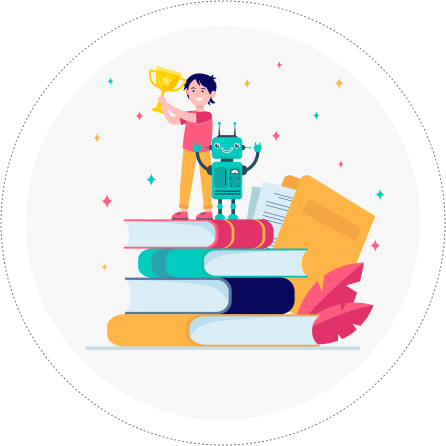Python
- Home
- / Python Handay
- / Python
Python Programming
Prerequisites
Learning Objectives
Course Overview
– Overview of Python: Advantages & Disadvantages
– Features, Flavors, Scope, and Applications
– Python Virtual Machine (PVM)
– Installation and Path Setup
– Python IDEs: Overview
– Writing & Executing First Program in IDLE
– Input/Output Operations
– Tokens, Keywords, and Identifiers
– Naming Rules for Identifiers
– Variables: Multi-Assignment & Dynamic Typing
– Literals, Punctuators, and Escape Sequences
– Expressions, Statements, and Comments
– Data Types: Definition and Classification
– Type Casting and Mutable vs. Immutable Types
– Operators: Types and Usage
– Expressions & Statements: Evaluation
– Operator Precedence and Associativity
– Types of Statements in Python
– Control Flow: Sequence, Blocks & Indentation
– Conditional Statements: `if`, `if…else`, `elif`
– Iteration: Loop Types (`for`, `while`) and `range()`
– Loop Control: `break`, `continue`, `pass`, Nested Loops
– Strings: Definition and Creation
– Indexing, Traversing, and Slicing Strings
– String Operators and Common Methods
– Regular Expressions and Metacharacters
– Lists: Definition and Creation
– Indexing, Traversing, and Slicing Lists
– List Operators and Common Methods
– Nested Lists, List Comprehensions, and Cloning
– Tuples: Definition, Creation, Packing, and Unpacking
– Tuple Operators and Methods
– Sets: Definition, Creation, Traversing, and Operations
– Arrays: Definition, Creation, Indexing, and Slicing
– Dictionaries: Structure and Creation
– Accessing and Traversing Elements
– Adding Values and Membership Testing
– Common Methods and Key Properties
– Ordered Dictionaries
– Introduction to Functions: Purpose and Types
– Defining, Calling, and Execution Flow
– Parameters: Types and Scope
– Returning Values and Recursive Functions
– Modules and Libraries: Importing and Creating
– Anonymous Functions (Lambdas) and Decorators
– Introduction to OOP Principles
– Creating Classes and Objects
– Accessing Attributes and Methods, and the `self` Keyword
– Constructors, Destructors, and Constructor Chaining
– Getter and Setter Methods
– Inheritance: Types and Constructor Behavior
– Method Overriding and `super()`
– Abstract Classes, Method Resolution Order (MRO)
– Access Modifiers: Public, Private, Protected
– Inner Classes, Composition, Aggregation, and Operator Overloading
– Types of Errors and Exceptions
– `try`, `except`, and `finally` Blocks
– Assertions and Raising Exceptions
– User-Defined Exceptions and Logging
– Data Files: Purpose and Operations
– File Handling: Opening, Closing, Reading, and Writing
– Text and Binary Files: Operations and Methods
– Using `pickle` and `csv` Modules for File Operations
– Random Access and File Compression
– Overview of Database Connectivity
– Steps for Establishing Connections
– Using `connect()` and `cursor` Classes
– CRUD Operations with Databases
– Using MySql and MongoDB with Python
Enquiry Now
Our Courses
Select Tech MindGuru for Why ?
Placement Assistance
Placement assistance offered for a successful career.
Membership
Membership provided until the final examination.
Personalized Attention
Personalized attention provided to each student.

Get Course Certificate
Certificate awarded upon completion of the course.
Monthly Tests
Regular monthly test series for progress evaluation.
Latest CBSE Syllabus
Training modules aligned with the latest CBSE syllabus.
Frequently Asked Questions
Anyone, even beginners with basic computer skills, can learn Python.
The course typically lasts 2 to 3 months.
Jobs are available in software, data science, and AI on platforms like LinkedIn and Indeed.
Companies like Google, Facebook, Netflix, and Dropbox use Python.
It’s easy to learn, versatile, and used in many fields like web development and data science.
Python’s simple syntax and wide application make it great for both beginners and professionals.
Yes, frameworks like Django and Flask help build web applications.
Yes, Python can automate tasks like file management and data entry.
Yes, you can create simple games with libraries like Pygame.
Python has powerful libraries like NumPy and TensorFlow for data analysis and machine learning.
Python is used in web development, data science, automation, AI, and more.
Python is an interpreted language, running code line by line for easy testing and debugging.


